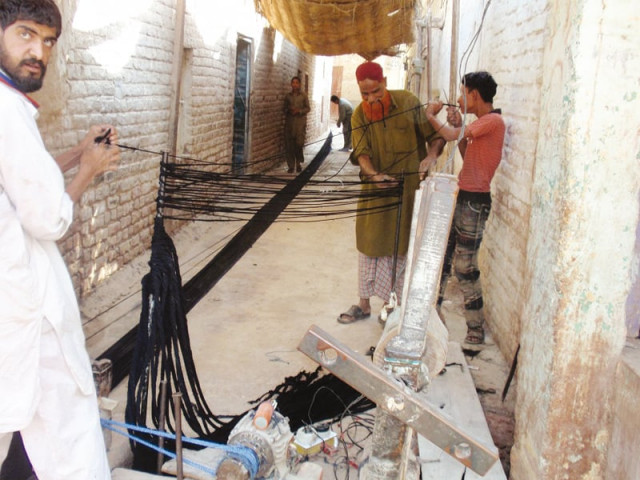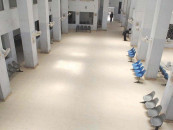An ignored craft: Learning the ropes
The Express Tribune takes a look into an old profession, one that is often passed on from father to son.

The raw material provided by big dealers is spun for Rs30 per kilogramme. On average, the labourers are able to prepare 60 to 65 kilogrammes of rope in a day. PHOTOS: EXPRESS
“In 1947, I was just eight years old when I crossed into Pakistan with my father. We did here what we did there - spin rope from raw thread. That’s what we are experts at,” says the resident of Nusrat Colony-5, Old Sukkur. “Today, I am in the same business, and have now been joined by my sons and grandsons.”
The business of binding
According to Rasheed’s son, Mohammad Ashfaq, who works alongside his father, the number of those in this craft has significantly decreased.

“Earlier, there were around 250 families in Sukkur involved in the business. Now, less than 100 remain,” says Ashfaq. “In this field, it’s not about man power, but very hard labour is required. We start at dawn and continue past noon. It’s exhausting.”
Ashfaq says big dealers provide them with raw material, which is then spun for Rs30 per kilogramme. On average, they are able to prepare 60 to 65 kilogrammes of rope in a day. After the payment of labour wage, only around Rs750 remain.
“Rs30 per kg is nothing compared to the labour that goes in, but we cannot argue with these dealers or they stop providing raw material,” he explains further. “We are uneducated and cannot do anything else. This is the only skill we have.” The dealers, he says, sell the rope at Rs90 to Rs120 per kg.
While the rope spinners seem content, they do speak of difficulties. Tahir has been spinning for 15 years and makes Rs500 a day or Rs800 when he pulls a double shift. Guddu, with 10 years of experience, makes Rs350.

“It’s not an easy job,” Guddu claims. “It requires full time attention, and five persons are needed to turn the raw material into rope. If one person fails to turn up, the four ones that did go home empty handed.” Then, he smiles and adds, “In my opinion, this work should be done in jail, because there is 100% attendance over there.”
A skill worth having
Abdul Latif Khan is seventy-five years old but continues to work eight hours a day. He migrated from across the border in 1953, and he, too, has spun ropes in both countries - with his father Abdul Ghafoor in undivided India, and with his sons and grandsons here.
“Before switching over to electric motors, spinning rope was done manually and was much more tiring. These motors have made our job much easier,” states Khan. “But this also means that the labourers have to work speedily, in order to match the speed of the motor.” Khan is also joined by his sons. Ubaid left school after completing his primary education, whereas Rafiq, an intermediate, quit his job as a clerk to join the business.
According to Khan, he and his father stayed in the business because of lack of education. However, today, even intermediate level graduates are scrambling around, looking for jobs.
Rafiq is thankful for this know-how. “I was getting Rs 10, 000 per month from the company and had to work more than twelve hours. Therefore, I quit my job and started working with my father,” Rafiq explains. “Now, after working for six to seven hours with my father, I do a part time job that pays Rs6, 000. It’s better this way.”
“Look, look. That’s our fourth generation at work,” says Khan, pointing at Rafiq. “I inherited the expertise from my forefathers and have passed it on accordingly.”
Published in The Express Tribune, December 24th, 2013.



















COMMENTS
Comments are moderated and generally will be posted if they are on-topic and not abusive.
For more information, please see our Comments FAQ